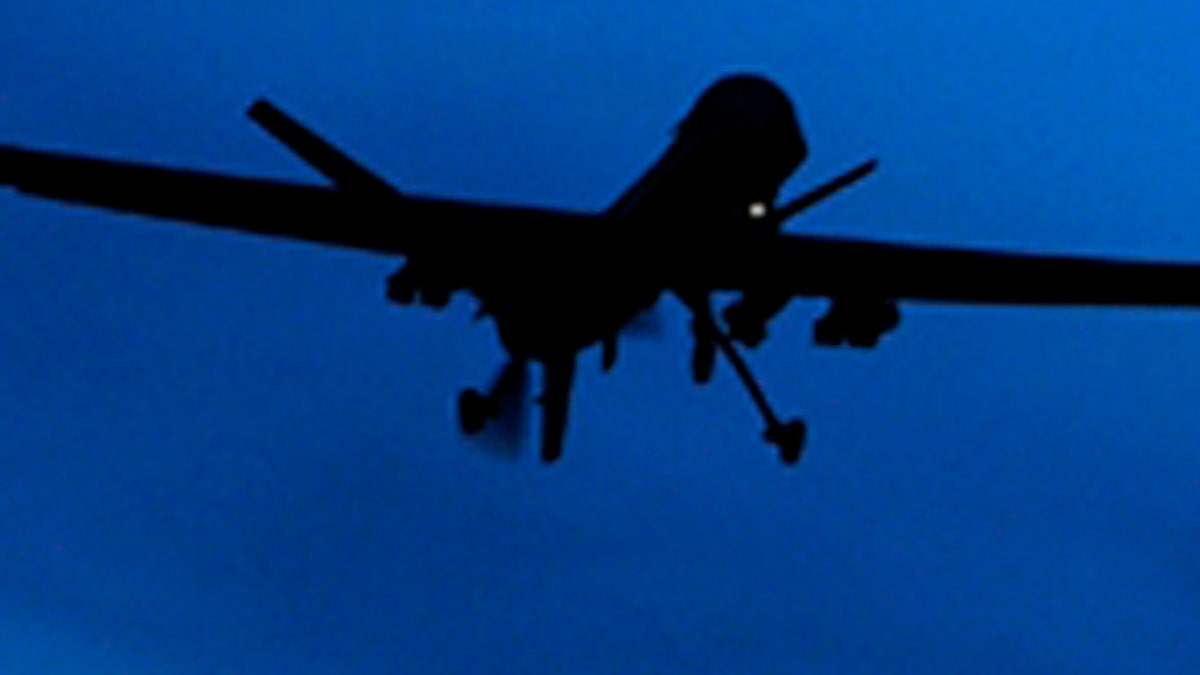
A U.S. Predator drone flies over the moon above Kandahar Air Field, southern Afghanistan Sunday, Jan. 31, 2010. The Pakistani army said Sunday that it was investigating reports that Pakistani Taliban leader Hakimullah Mehsud died from injuries sustained in a U.S. drone missile strike in mid-January. (AP Photo/Kirsty Wigglesworth) (AP2010)
Two U.S. senators introduced legislation Thursday prohibiting the use of drones to kill U.S. citizens in this country if they do not pose an imminent threat to national safety.
The bill, by Republicans Ted Cruz, of Texas, and Rand Paul, of Kentucky, came a day after Cruz engaged in a heated exchange with U.S. Attorney General Eric Holder in a hearing about the use of drones against U.S. citizens.
“Our Constitution restrains government power,” Cruz said in a statement about the measure. “The federal government may not use drones to kill U.S. citizens on U.S. soil if they do not represent an imminent threat. The Commander in Chief does, of course, have the power to protect Americans from imminent attack, and nothing in this legislation interferes with that power.”
The White House said that President Barack Obama does not have the authority to use a drone to kill a U.S. citizen on American soil if the citizen is not engaged in combat.
Obama spokesman Jay Carney said the attorney general made that assertion in a letter to Paul. The Kentucky senator has held up the nomination of John Brennan as CIA director amid claims that the administration could use drones to target Americans suspected of terrorism. Brennan was confirmed by the Senate late Thursday.
Carney said Holder sent the letter to Paul Thursday afternoon. Carney says White House officials have also been in touch with Paul's office.
The Cruz-Paul bill said: “The prohibition under this subsection shall not apply to an individual who poses an imminent threat of death or serious bodily injury to another individual. Nothing in this section shall be construed to suggest that the Constitution would otherwise allow the killing of a citizen of the United States in the United States without due process of law.”
At the Senate Judiciary Committee hearing on Wednesday, Holder said that the Obama administration will share more information with Congress and the American people about national security policies, particularly the government's use of drone strikes.
Both Democratic and Republican senators said they must have access to Justice Department memoranda that form the legal underpinning for precisely when the administration can use drone strikes to kill a suspected terrorist, even if the person is a U.S. citizen.
In his letter to Paul, the attorney general said the president could conceivably have no choice but to authorize the military use of such force in circumstances of a catastrophic attack like the ones suffered at Pearl Harbor and on Sept. 11, 2001.
But Holder emphasized that the administration has no intention of carrying out drone strikes in the United States. Holder said Rand's hypothetical is unlikely "and one we hope no president will ever have to confront."
At the hearing, Cruz tried to get a "yes" or "no" answer from Holder.
"Does the Constitution allow a U.S. citizen on U.S. soil who doesn't pose an imminent threat to be killed by the U.S. government?" asked Cruz.
"You have to look at all of the facts. But on the facts that you have given me, and this is a hypothetical, I would not think that in that situation the use of a drone or lethal force would be appropriate," Holder replied.
Cruz pressed on and eventually, the attorney general said "translate my appropriate to 'no.' I thought I was saying 'no.' All right? 'No.'"
The Associated Press contributed to this story.




